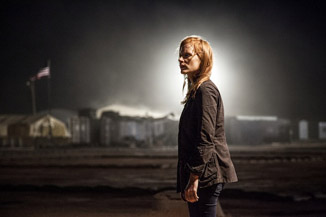Movie Review: Zero Dark Thirty
By Matthew Huntley
December 24, 2012
It’s fair to say this isn’t as striking or hard-hitting as Bigelow’s Strange Days or The Hurt Locker, for which she won the Academy Award for Best Director (the first female to take home the honor), since those movies were more ambitious and risky with their techniques. Zero Dark Thirty relies more on its content, which is inherently relevant and interesting, but just as Argo did, Bigelow relays it via traditional Hollywood means. Strange Days and The Hurt Locker were special because they retooled traditional formulas. Nevertheless, this is still a formidable, relentless thriller that continually builds tension all the way up to its last shot, where there comes a moment of well-earned absolution.
Bigelow possesses many gifts as a director, but her forte lies in her ability to place the audience at the scene. She’s helped, of course, by a superb technical team - in the case of The Hurt Locker and this film, a lot of the credit goes to the sound designers and mixers - who make it so the film affects us physically, and it takes a heightened sense of skill to pull that off. There are noisy films like Armageddon; and then there are effectively loud films like Zero Dark Thirty. This film actually scares us with its sounds as it recounts the major terrorist attacks carried out by al-Qaeda between 9/11 and bin Laden’s death on May 2, 2011. Even though we may sense these scenes coming, they still manage to shock us and catch us off guard, as if we’re there. And these aren’t “Gotcha!”-type moments like in a horror movie, but ones that disturb us viscerally and psychologically. They raise the tension so high that we start to want bin Laden dead as much as the heroine.
One of the best sequences takes place after Maya and her team clone the cell phone of one of bin Laden’s suspected couriers and drive aimlessly around a marketplace in Pakistan attempting to track him down. We want so badly for them to isolate the signal, yet we accept how many attempts it takes and what they’re essentially doing is searching for a needle in a haystack.
It’s interesting, but even though most of the scenes in this film manipulate us and are amplified for dramatic effect, it convinces us they could, or perhaps did, occur in real-life. That includes the CIA’s painfully slow response to act on Maya and her team’s intelligence that bin Laden is hiding out in a fortified compound in Pakistan. I believe that Maya, or anyone with a sense of commitment, really would write on her boss’s window the number of days that have passed where nothing has been done about it (she ends up writing on his window over a hundred days in a row and her irritation is palpable). The ever-versatile Chastain keeps her character grounded and unaffected, even though it must have been tempting to succumb to histrionics given the notoriety and controversy surrounding the material.
All movies should be effective in some way, and if the point of a thriller is to rouse us to the point where we experience the physical and mental anxieties of the characters, then Zero Dark Thirty is right up there with Argo as one of the better in recent memory, and each was directed by filmmakers who show they are fast becoming masters of this type of genre. And despite the supposed haziness surrounding its accuracy, I would say Zero Dark Thirty has significance beyond entertainment by instigating viewers to read up on how the events really happened. I’m not saying the film got them wrong, but like I said, I don’t go to the movies for fact; I go to the movies to be affected and this movie does just that.
Continued:
1
2
|
|
|
|




